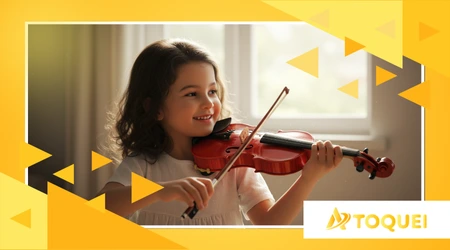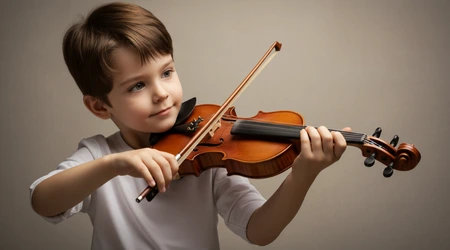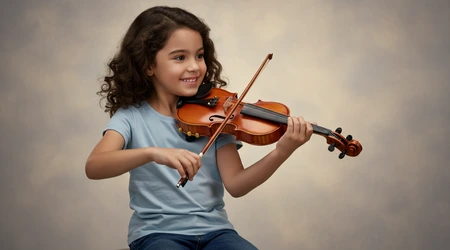What is the Ideal Age to Start Children's Violin Lessons?

Ideal age to start violin lessons is a common question among parents who want to introduce their children to the musical world.
Advertisements
Music, especially the violin, can transform child development, stimulating creativity, discipline, and coordination.
But when is the right time to start?
This article dives deep into this question, exploring factors such as motor development, emotional maturity, and pedagogical approaches, based on information updated in 2025.
We'll reveal, with solid arguments and practical examples, how to choose the best time for your child to embrace this fascinating instrument, without clichés or exaggerated promises.
Advertisements
The decision to start violin lessons involves more than just age. Every child is unique, with their own learning pace and interests.
Therefore, in addition to analyzing age groups, we will address how the environment, methodology, and even the choice of instrument influence this journey.
Get ready for an engaging read, with practical tips, a dash of science, and stories that connect theory to real life.
Why is the Violin Special for Children?
The violin, with its expressive sound, demands precision and sensitivity, qualities that flourish in childhood. Playing this instrument stimulates areas of the brain linked to memory and coordination.
A 2014 study from the University of Vermont showed that children who play stringed instruments have greater neural connectivity, benefiting academic skills.
Furthermore, the violin teaches patience, as mastering it requires constant practice.
++ How to Create a Mini Band with Simple Instruments at Home
Imagine the violin as a paintbrush that paints emotions. Children who play it learn to express complex feelings, like Clara, 6, who transformed her shyness into vibrant melodies.
Early musical development also strengthens self-esteem, as each note achieved is a small victory. Thus, the violin becomes a companion in emotional growth.
On the other hand, learning requires a welcoming environment. Teachers who use playful methods, such as Suzuki, make classes fun and maintain children's interest.
Choosing the right time to start maximizes these benefits, but requires paying attention to your child's signs of readiness.

The Ideal Age to Start Violin Lessons and Child Development
Determine the ideal age to start violin lessons depends on physical and cognitive development.
Experts suggest that children as young as 4 can begin, but with adapted approaches. At this stage, fine motor skills are developing, essential for holding the bow and pressing the strings.
Below is a table with recommended ages and violin sizes:
| Age | Violin Size | Features |
|---|---|---|
| 3-5 years | 1/16 or 1/10 | Small, light, ideal for initial musicalization |
| 5-7 years | 1/8 or 1/4 | Allows greater precision in movements |
| 7-9 years old | 1/2 | Suitable for growing hands |
| 9+ years | 3/4 or 4/4 | Standard size for teens and adults |
At age 4, lessons focus on musical development, not complex technique. Children like Pedro, 5, started with rhythmic games before playing.
This builds familiarity with the instrument, avoiding frustration. ideal age to start violin lessons It varies, but progress depends more on motivation than on exact age.
Between the ages of 6 and 8, many children are strong enough to hold the violin correctly. At this stage, they grasp concepts like rhythm and melody more easily.
However, forcing learning too early can lead to disinterest, so pay attention to your child's natural curiosity.
See more: Honest Review: Children's Toy Instrument That Actually Teaches
Pedagogical Methods: The Key to Success
The right methodology makes all the difference in ideal age to start violin lessons. The Suzuki method, for example, inspired by language acquisition, is widely used.
He encourages children from the age of 3 to listen and imitate, as Karen Passarelli, a teacher with 13 years of experience, explains: “Children learn music like they learn to speak, through imitation and repetition.”
Other methods, such as the traditional one, can be more demanding, recommended from the age of 6, when reading sheet music becomes feasible.
See also: How to Stimulate Musical Interest in Children From Babies
Schools like the Souza Campos Musical Institute use playful approaches, with characters that make learning engaging.
The choice of method must align with the child's pace, respecting their maturity.
Furthermore, group lessons, common in music programs, promote socialization. Children learn to collaborate, much like on a soccer team, where each player contributes to the goal.
This environment encourages ideal age to start violin lessons, as it combines fun and learning, while maintaining enthusiasm.
Signs of Readiness: How Do You Know if It's the Right Time?
More important than the ideal age to start violin lessons is the child's readiness. Genuine interest in music is the first sign.
If your child sings, dances, or is captivated by the sounds of the violin, they may be ready. Motor coordination is also crucial: can they hold small objects firmly? Test with a pencil.
Focus ability is another indicator. Children 4 and older can typically maintain attention for 15–20 minutes, ideal for short lessons.
Patience and resilience also count, as the violin requires practice. Talk to the teacher to assess whether the child is ready.
Finally, parental involvement is essential. Attending classes, as in the Suzuki method, reinforces learning.
If the family creates a musical environment, with playlists or live performances, the child will be more motivated, regardless of age.
Benefits of Starting Early (But Without Pressure)
Start at ideal age to start violin lessons brings lasting benefits. Children who play from an early age develop discipline and concentration.
A 2023 report from the Suzuki School found that 851% of children who started before age 7 maintained their musical interest into adolescence. This demonstrates the impact of a well-planned introduction.
Furthermore, violin improves social skills. In group lessons, children learn to listen to and respect their peers, just like in an orchestra where every note counts.
The practice also reduces stress, offering a creative outlet for emotions.
However, starting early doesn't mean pushing. Forcing a child can lead to abandoning the instrument.
The balance between stimulus and freedom is essential for learning to be enjoyable and sustainable.
The Role of the Right Instrument in Your Musical Journey
Choosing the right violin is as important as the ideal age to start violin lessonsAn inadequate instrument can make learning difficult.
Younger children need fractional violins (1/16 to 3/4) that adjust to their body size. Brands like Stentor and Yamaha offer affordable, high-quality options.
Buying used can be a good idea, as children grow quickly and change sizes. However, check the instrument's condition with a luthier.
A well-tuned violin makes playing easier and keeps you motivated, as happened with Sofia, 7, who fell in love with the sound of her 1/4.
Ergonomics also matter. Light strings and a well-balanced bow reduce physical strain. Talk to your teacher to ensure the instrument is suitable for you, maximizing your playing pleasure from the start.
Challenges and How to Overcome Them

It's not all melody when you start violin lessons. ideal age to start violin lessons can bring challenges, such as lack of patience or motor difficulties.
Younger children can become frustrated with the instrument's complexity. The solution? Short, fun lessons, with breaks for games.
Another obstacle is parental pressure. High expectations can be demotivating. Instead, celebrate small progress, like playing a scale.
Experienced teachers know how to turn challenges into opportunities, using rhythmic games to maintain interest.
Finally, cost can be a concern. Lessons and instruments require investment, but scholarships and community programs, such as those offered by local orchestras, make access more democratic. Research options in your area.
The Importance of the Family and School Environment
The environment directly influences the ideal age to start violin lessonsFamilies that value music create fertile ground for learning.
Playing music at home or attending children's concerts sparks curiosity. Schools with music programs also foster interest.
Parents don't have to be musicians to be supportive. Just attending lessons or praising their efforts makes a difference.
Schools like Suzuki host events where children play together, building confidence. A positive environment is the stage where talent flourishes.
Furthermore, interacting with other musical children boosts motivation. Music groups, common in music schools, create social bonds.
THE ideal age to start violin lessons gains strength when the child feels part of a musical community.
Conclusion: What is the Perfect Moment?
THE ideal age to start violin lessons It is not a fixed number, but a balance between readiness, interest and support.
Children as young as 4 can start with musicalization, while 6-8 years old are ideal for more advanced techniques.
The important thing is to respect your child's rhythm, providing a welcoming environment and a suitable instrument. Why not turn musical curiosity into a journey of discovery?
With methods like Suzuki, family support, and qualified teachers, the violin can be more than just an instrument: it's a bridge to holistic development.
Choose your moment carefully, watch for signs of readiness, and celebrate each achievement. The music awaits its little maestro—how about starting today?
Frequently Asked Questions
1. Can my 3-year-old start violin lessons?
Yes, with playful musicalization, but formal classes are more effective from the age of 4.
2. What is the average cost of children's violin lessons?
It ranges from R$80 to R$200 per hour, depending on the region and the teacher.
3. Is it necessary to buy a new violin?
No, used instruments in good condition are great options for beginners.
4. How do I know if my child is ready for the violin?
Observe interest in music, motor coordination, and ability to focus for 15-20 minutes.
5. Are group or individual classes better?
Group classes encourage socialization; individual classes focus on personalized progress. It depends on the child.
